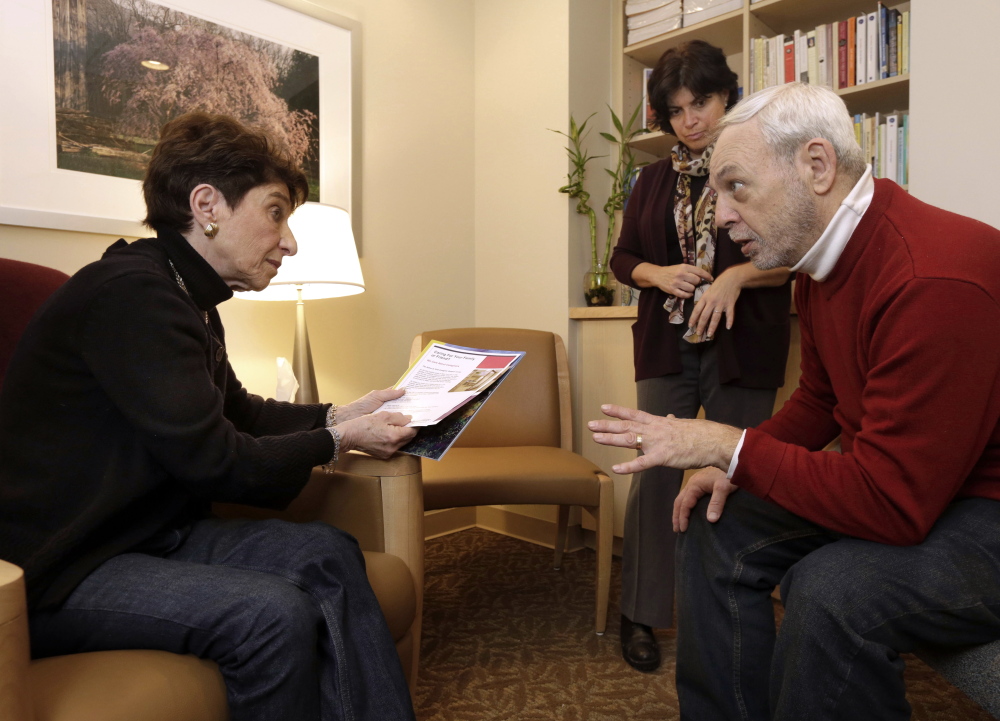WASHINGTON — Edwin Pacheco was in and out of the hospital for months. He’d survived one organ transplant and desperately needed another.
But he wasn’t the only one suffering. Few people asked how his wife was holding up as she kept vigil, cornered hard-to-understand doctors and held job and family together.
“Everybody was like, ‘Oh, you’re a good caregiver.’ But inside, I’m dying,” Minerva Pacheco of New York recalls of those tumultuous days.
Then one day in the intensive care waiting room at Montefiore Medical Center, a pair of strangers introduced themselves as volunteer coaches for caregivers and offered a shoulder. It’s part of an unusual program that recruits retirees and specially trains them to help overwhelmed family members cope with a scary hospital stay – for their own health, and so they can better care for their loved one.
“The caregiver needs to be taken care of, too,” said Montefiore coach Dave Wolffe, a retired high school guidance counselor who spotted Pacheco’s distress. “If they’re sick, or they break down, feel helpless or hopeless, they’re not going to be too helpful to the patient.”
The coaches offer more than emotional support and a sympathetic ear. They’re trained to help people navigate a complex hospital system and to help them locate community resources that may ease the strain, too.
They can track down a doctor to answer a caregiver’s questions. Or find someone to translate all the medical jargon. Or alert a professional to signs of depression.
Or gently probe about just how prepared the family really is for continuing care at home: Are they comfortable giving injections, or cleaning a wound – or might they need some more planning with the discharge team?
Today’s caregivers “are being asked to do a lot of things they’re really not equipped to do,” said social worker Randi Kaplan, who directs the Montefiore Caregiver Support Center. The program evolved as the hospital realized, “we’re ignoring a very, very overstressed population.”
Millions of Americans regularly care for older or impaired adult relatives or friends, and a hospitalization only adds to the stress. Yet research shows that patients who have supportive care from family or friends during a hospitalization fare better.
“You don’t eat right, you don’t sleep right,” said Pacheco, who hadn’t known she could seek help for herself as her husband worsened between his first transplant in December 2012 and the one that finally restored his health last summer. “You’re scared to ask what’s next.”
Families need an advocate, said Dr. Paul Levin, Montefiore’s vice chairman of orthopedic surgery, who tells the volunteer coaches, and medical students, how caregivers can get lost in the shuffle.
Years ago, Levin’s oldest daughter had a roller-blading accident and was run over by a bus, suffering life-threatening injuries while at college hundreds of miles from home.
In a hospital where he knew no one, even Levin had a hard time cornering doctors, got conflicting reports, and once watched his daughter being wheeled off to deal with a dangerous complication without any explanation.
“I’m a trauma specialist who knows the system, knew the questions to ask, but I couldn’t get a straight answer,” Levin said.
The volunteer coaches are retirees with no background in health care, who undergo training to support caregivers in hopes that families will let their guard down with a peer.
They make daily rounds through Montefiore’s waiting rooms and nursing stations to offer the services of the support center, where families can talk with a coach or a social worker, research caregiver resources online, or just relax in a quiet room. There are no statistics on similar volunteer initiatives.
Copy the Story LinkSend questions/comments to the editors.



Success. Please wait for the page to reload. If the page does not reload within 5 seconds, please refresh the page.
Enter your email and password to access comments.
Hi, to comment on stories you must . This profile is in addition to your subscription and website login.
Already have a commenting profile? .
Invalid username/password.
Please check your email to confirm and complete your registration.
Only subscribers are eligible to post comments. Please subscribe or login first for digital access. Here’s why.
Use the form below to reset your password. When you've submitted your account email, we will send an email with a reset code.